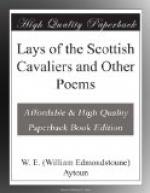Drifting down the island’s lee,
And our crazy bark was whirling
Like a nutshell on the sea—
When the nights were dark and dreary,
And amidst the fern we lay,
Faint and foodless, sore with travel,
Waiting for the streaks of day;
When thou wert an angel to me,
Watching my exhausted sleep—
Never didst thou hear me murmur—
Couldst thou see how now I weep!
Bitter tears and sobs of anguish,
Unavailing though they be:
Oh, the brave—the brave and noble—
That have died in vain for me!
NOTES TO
“CHARLES EDWARD AT VERSAILLES”
Could I change this gilded bondage
Even for the dusky tower
Whence King James beheld his lady
Sitting in the castle bower.—p.
168.
James I. of Scotland, one of the most accomplished kings that ever sate upon a throne, is the person here indicated. His history is a very strange and romantic one. He was son of Robert III., and immediate younger brother of that unhappy Duke of Rothesay who was murdered at Falkland. His father, apprehensive of the designs and treachery of Albany, had determined to remove him, when a mere boy, for a season from Scotland; and as France was then considered the best school for the education of one so important from his high position, it was resolved to send him thither, under the care of the Earl of Orkney, and Fleming of Cumbernauld. He accordingly embarked at North Berwick, with little escort—as there was a truce for the time between England and Scotland; and they were under no apprehension of meeting with any vessels, save those of the former nation. Notwithstanding this, the ship which carried the Prince was captured by an armed merchantman, and carried to London, where Henry IV., the usurping Bolingbroke, utterly regardless of treaties, committed him and his attendants to the Tower.
“In vain,” says Mr. Tytler, “did the guardians of the young Prince remonstrate against this cruelty, or present to Henry a letter from the King his father, which, with much simplicity, recommended him to the kindness of the English monarch, should he find it necessary to land in his dominions. In vain did they represent that the mission to France was perfectly pacific, and its only object the education of the prince at the French court. Henry merely answered by a poor witticism, declaring that he himself knew the French language indifferently well, and that his father could not have sent him to a better master. So flagrant a breach of the law of nations, as the seizure and imprisonment of the heir-apparent, during the time of truce, would have called for the most violent remonstrances from any government, except that of Albany. But to this usurper of the supreme power, the capture of the Prince was the most grateful event which could have happened; and to detain him in captivity became, from this moment, one of the principal objects of his future life; we are not to wonder, then, that the conduct of Henry not only drew forth no indignation from the governor, but was not even followed by any request that the prince should be set at liberty.




